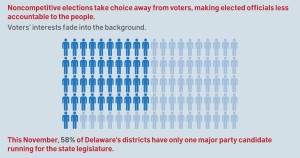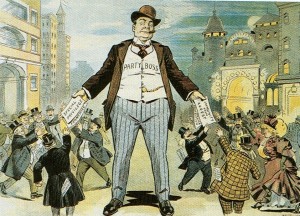Yesterday, I drafted an email to Common Cause Delaware members about our legislative accomplishments during the 2016 session. We did have some big wins. We helped pass a number of bills – rescission of all calls for a constitutional convention, removing financial barriers to the restoration of voting rights to people returning from prison, reducing the waiting period for municipal voting, and a couple relatively minor transparency bills. And we beat back two more attempts to increase the amount of money in Delaware politics. (Add that to the two similar bills we killed in 2015.)
 What stood out most clearly, however, were all the bills we were unable to get passed – bills to increase disclosure, allow same-day voter registration and no-excuse absentee voting, prevent conflicts of interest in the legislative branch, majorly increase transparency, end partisan Gerrymandering, ban gifts from lobbyists to lawmakers, establish equal protection, and create a system of small donor public financing that would eliminate barriers to running for office. And to be clear, politicians in both parties opposed our agenda.
What stood out most clearly, however, were all the bills we were unable to get passed – bills to increase disclosure, allow same-day voter registration and no-excuse absentee voting, prevent conflicts of interest in the legislative branch, majorly increase transparency, end partisan Gerrymandering, ban gifts from lobbyists to lawmakers, establish equal protection, and create a system of small donor public financing that would eliminate barriers to running for office. And to be clear, politicians in both parties opposed our agenda.
What will it take to move a democracy reform agenda forward in Delaware?
The first thing people say when someone complains about the political situation is “you need to vote!” Voting is important, but it is hardly a panacea. Consider this: In 58% of general election legislative races this year in Delaware, the candidate has no opponent from the other major party. So in 58% of legislative races, whether people vote or not, it won’t affect the outcome.
 In addition, however, nine legislative districts will have primaries (17%). And since Delaware is a Democrat-dominated state with Gerrymandered districts, primaries can be more determinative than the general election. For example, we know whoever wins the Democratic Congressional primary is our next Congressperson.
In addition, however, nine legislative districts will have primaries (17%). And since Delaware is a Democrat-dominated state with Gerrymandered districts, primaries can be more determinative than the general election. For example, we know whoever wins the Democratic Congressional primary is our next Congressperson.
Clearly, we need to recruit people to run who will support the democracy reform agenda. We need to elect courageous, principled people who will stand up for reform, do the right thing, even when it does not advance their career or maintain their power. Obviously this is a tall order.
Even if you can find such individuals to run, the realities of our current system work against political courage. Once you start focusing on raising money and getting votes, it can make principles seem like self-defeating purism. “Well,” you tell yourself, “I won’t be able to do any good, if I don’t get elected. So maybe it’s OK to compromise in this case.” Next thing you know, you are on the proverbial slippery slope.
 Partly it’s a character issue; candidates should have backbones. When I was running for state senate, I examined educational funding and discovered that here in Sussex County, we are obviously in need of a property tax reassessment. We haven’t had one since 1974! “Oh no,” one of my advisors told me, “You can’t propose a property tax reassessment. You won’t get elected! Wait until you’re in office. Then you can propose it.”
Partly it’s a character issue; candidates should have backbones. When I was running for state senate, I examined educational funding and discovered that here in Sussex County, we are obviously in need of a property tax reassessment. We haven’t had one since 1974! “Oh no,” one of my advisors told me, “You can’t propose a property tax reassessment. You won’t get elected! Wait until you’re in office. Then you can propose it.”
Yeah right. A person too timid to propose something while running for office is definitely going to grow a spine once elected!
We all know that politicians can lack courage – which is why we need strong social movements. As FDR reportedly once said, “OK, you’ve convinced me. Now make me do it!” And that is where issue-based organizations come in.
Problematically, however, many supposedly independent organizations seem to be more concerned about stroking incumbents than endorsing candidates who support their agenda. In a way that makes sense. Many politicians are petty and vindictive – indeed the culture seems to encourage it – and so organizations are scared to alienate incumbents who (on average) have a 90% chance of getting reelected.
For example, during my campaign, I sought the endorsement of DSEA. I have 25 years of classroom teaching experience and came out 100% in support of the DSEA agenda, yet they decided to endorse my opponent, who strongly supports charter schools and is “open” to considering vouchers. Some might say, they made the right choice. I did lose, after all, but how much did their decision hurt me?
In my opinion, issue groups should remain neutral when there are multiple candidates running who support their agenda. Otherwise, what are they basing their endorsement on, the personal preferences of the leadership?
That is why I am disappointed in the recent endorsement decisions by the Barbara Gittings Delaware Stonewall Democrats. Why would they endorse Bethany Hall-Long over a number of other candidates who support equality just as strongly, if not more strongly, than she? Why wouldn’t they remain neutral?
Even more perplexing, why would Stonewall endorse Speaker Pete Schwartzkopf over Don Peterson, who is running for the House as an openly gay man – a first? Both men fully support the LGBT agenda, and with legal equality firmly established in Delaware, it seems like electing more openly LGBT people to office would be a priority for Stonewall.
Stonewall says they “endorsed [Hall-Long], as we have other candidates, because she supported our efforts at non-discrimination, marriage equality and transgender rights.” Yes, they did – but they only had the opportunity to do so because they were actually in office! Don Peterson would have supported the LGBT agenda. Sherry Dorsey Walker would have supported the agenda. Kathy McGuiness would have supported the agenda. I am sure Ciro Poppiti and Brad Eaby would have as well. Why weigh in?
 I find the pro-incumbent policy of many issue-based organizations unfair and politically problematic. It simply augments the tremendous advantage incumbents already have. It’s hard to run against an incumbent. Their names are known. Their activities are considered newsworthy. The party apparatus favors them. Their districts are Gerrymandered. They hardly need stroking from “independent” groups.
I find the pro-incumbent policy of many issue-based organizations unfair and politically problematic. It simply augments the tremendous advantage incumbents already have. It’s hard to run against an incumbent. Their names are known. Their activities are considered newsworthy. The party apparatus favors them. Their districts are Gerrymandered. They hardly need stroking from “independent” groups.
I am glad to be a part of an organization that does not put its hand on the scale but simply calls on all candidates to support the democracy reform agenda. Common Cause works to let voters know where candidates stand, we work with elected officials to pass legislation, and we call people out when necessary. It’s all about the issues.
Given the political terrain, it’s tough work to move a reform agenda forward. People with power do not want to give up power. And people who think they have “access” to power want to keep it.
 But all is not lost because the real power in this state and country is the power of the people. We still have the right to speak out, to organize, to mobilize, to pressure our elected officials to implement our will, to recruit good candidates to run for office, and support them when they do.
But all is not lost because the real power in this state and country is the power of the people. We still have the right to speak out, to organize, to mobilize, to pressure our elected officials to implement our will, to recruit good candidates to run for office, and support them when they do.
What will it take to move the democracy agenda forward in Delaware? An engaged citizenry.
Let’s get to work.